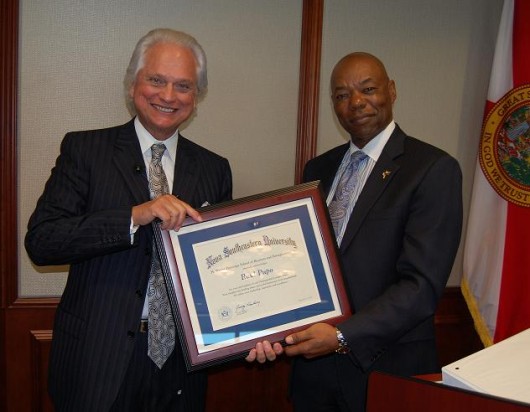NSU Newsroom
SharkBytes
Horizons
This version of NSU News has been archived as of February 28, 2019. To search through archived articles, visit nova.edu/search. To access the new version of NSU News, visit news.nova.edu.
This version of SharkBytes has been archived as of February 28, 2019. To search through archived articles, visit nova.edu/search. To access the new version of SharkBytes, visit sharkbytes.nova.edu.
Distinguished Lecturer Addresses Service Management at Business School
Many of us have experienced bad service, but not many have made it their business to study it and find solutions. On March 21, Raul Pupo spoke at the H. Wayne Huizenga School of Business and Entrepreneurship’s Distinguished Lecture Series, presenting on “The Correlation between Service Management and Profitability.”
Pupo is an entrepreneur, author, speaker, educator and consultant who has helped clients worldwide to solve business and service issues utilizing unique techniques and proprietary intellectual capital. The author of America’s Service Meltdown: Restoring Service Excellence in the Age of the Customer, Pupo relayed the results of a study conducted with top executives at 250 public companies. Their executives said that 82 percent of customers would rate the company’s service as “excellent.” In reality, only 8 percent of such customers noted customer service to be excellent. “This is a serious problem, but it’s also an opportunity,” said Pupo, explaining that companies providing great service not only raise the bar, but also leave their competitors behind.
Most people agree that there is a “service meltdown,” but it takes a customer-focused leader and a service-oriented culture to create change. Pupo discussed the many reasons why we do not have good service, from time and money to communication and the right leadership. Larry Bossidy, the former Chairman and CEO of Honeywell International, wrote about this in his book, Execution, stating that in order to execute and have success, you must have the right people in the right place.
Pupo’s presentation also reviewed the catalyst factor, the customer-centered process and the service ethic. Taking many questions from the audience, Pupo provided facts and figures to crystalize the effects of failed product service, giving Digital Equipment, Polaroid and Wang Computers as examples. He noted that 50 percent of companies disappeared from 1987 to 2007. While some were merged or bought out, the vast majority failed due to product service. Further noting that, “there is much that can be done to remedy service, which would improve both the financial and economic situation in the long run.”
